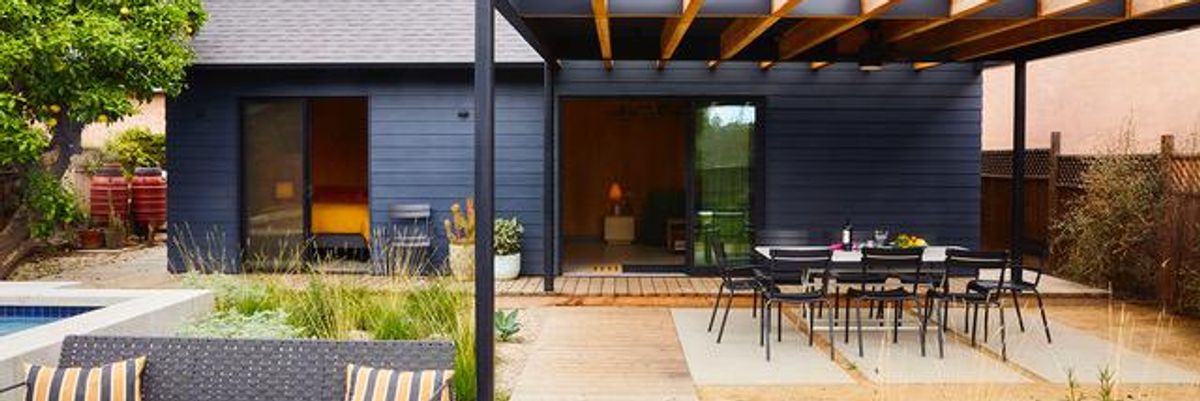

Get in the KNOW
on LA Startups & Tech
X
Design, Bitches
Looking to Build a Granny Flat in Your Backyard? Meet the Firms and Designs Pre-Approved in LA
Sarah Favot
Favot is an award-winning journalist and adjunct instructor at USC's Annenberg School for Communication and Journalism. She previously was an investigative and data reporter at national education news site The 74 and local news site LA School Report. She's also worked at the Los Angeles Daily News. She was a Livingston Award finalist in 2011 and holds a Master's degree in journalism from Boston University and BA from the University of Windsor in Ontario, Canada.
Adding a backyard home in Los Angeles is now nearly as easy as buying a barbecue.
Homeowners who for years have wanted to build a granny flat in their backyard, but dreaded the red tape, can now choose from 20 pre-designed homes that the city has already approved for use.
The shift, made official last week, will speed up a weeks-long process and bring more badly needed units to an overpriced market. It also has the potential to elevate the 14 startups and firms building the next generation of homes.
The designs for the stand-alone residences range from a 200-square-foot studio to a 1,200-square foot, two-story, two-bedroom unit. And many of the homes are filled with design flourishes, reflecting the diverse architecture of the city, from a house in the silhouette of a flower to one with a spiral outdoor staircase leading to the roof.
It's no surprise. The program was spearheaded by Christopher Hawthorne, a former architecture critic at the Los Angeles Times and now the city's chief design officer.
The firms are primarily local and startup architecture and design firms, while others are well-known with a history of building granny flats, also know as accessory dwelling units, or ADUs.
The standard plans avoid the Los Angeles Department of Building and Safety's typical four-to six-week review process and can allow approvals to be completed in as quickly as one day.
Some aspects of the plans can be modified to fit a homeowner's preferences. Eight other designs are pending approval.
Mayor Eric Garcetti believes by adding more such units, the city can diversify its housing supply and tackle the housing crisis. Recent state legislation made it easier to build the small homes on the lot of single-family residences. Since then, ADUs have made up nearly a quarter of Los Angeles' newly permitted housing units.
Because construction costs are relatively low for the granny flats – the pre-approved homes start at $144,000 and can go beyond $300,000 – the housing is generally more affordable. The median home price in L.A. County in January was $690,000.
Here's a quick look at the designs approved so far:
Abodu
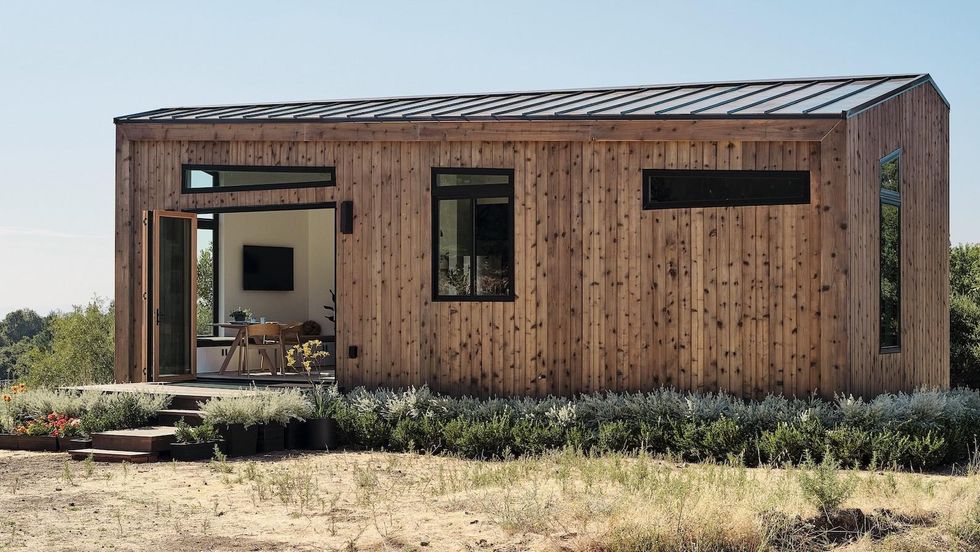
Abodu
Abodu, based in Redwood City in the Bay Area, exclusively designs backyard homes. In 2019, it worked with the city of San Jose on a program similar to the one Los Angeles is undertaking.
In October, it closed a seed funding round of $3.5 million led by Initialized Capital.
It has been approved for a one-story 340-square-foot studio, a one-story one-bedroom at 500 square feet, and a one-story, 610-square-foot two-bedroom.
The pricing for the studio is $189,900, while the one-bedroom costs $199,900 and the two-bedroom is $259,900.
Amunátegui Valdés Architects
Led by Cristobal Amunátegui and Alejandro Valdés, the firm was founded in 2011 and has offices in Los Angeles and Santiago, Chile. Amunátegui is an assistant professor at the Department of Architecture and Urban Design at UCLA.
The firm designs work in various scales and mediums, including buildings, furniture and exhibitions.
Its one-story, two-bedroom with a covered roof deck 934-square-foot unit is pending approval from the city.
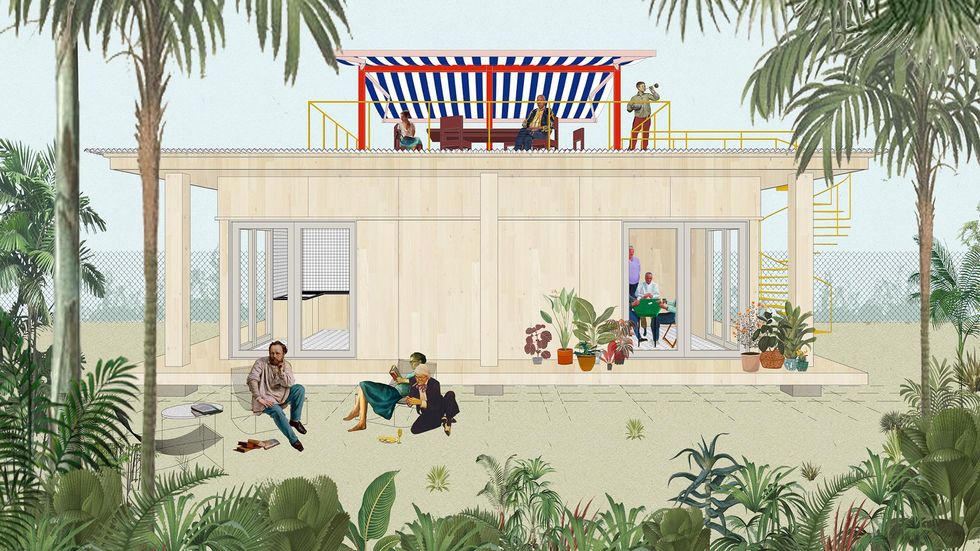
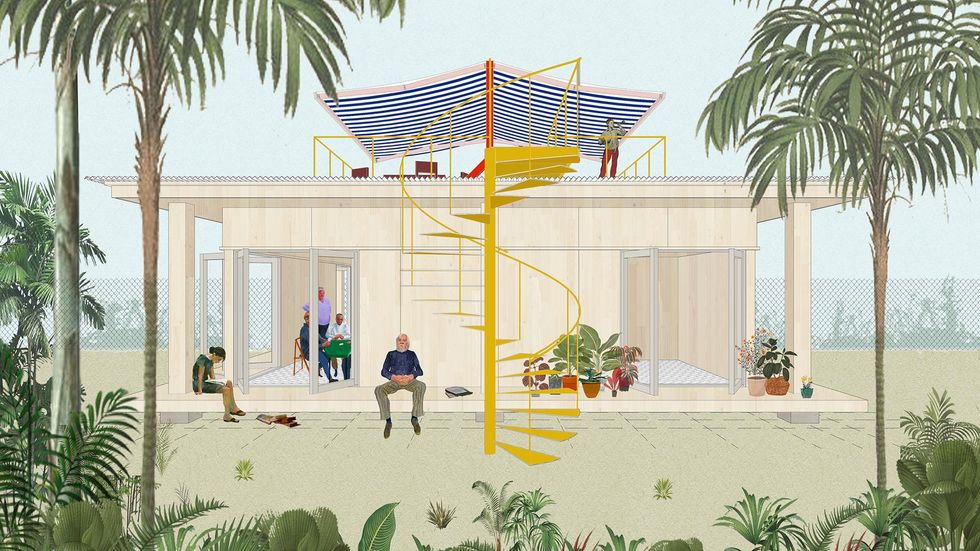

Connect Homes
Connect Homes has a 100,000-square foot factory in San Bernardino and an architecture studio in Downtown L.A.
It specializes in glass and steel homes and has completed 80 homes in California. Its designs have an aesthetic of mid-century modern California residential architecture.
It has two one-bedroom models pre-approved by the city, one is 460 square feet, which costs $144,500 with a total average project cost of $205,000. The other is 640 square feet, which costs $195,200 with a total project cost of $280,000.
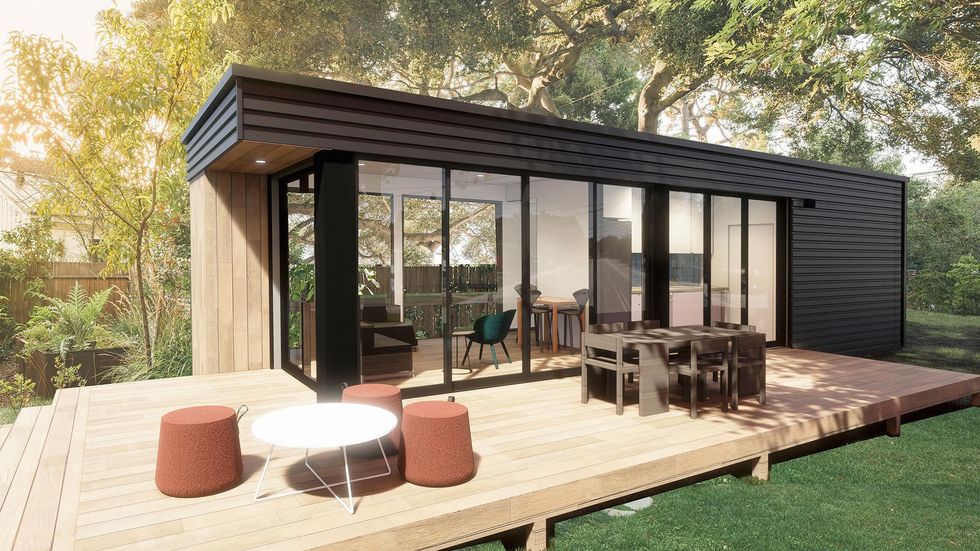
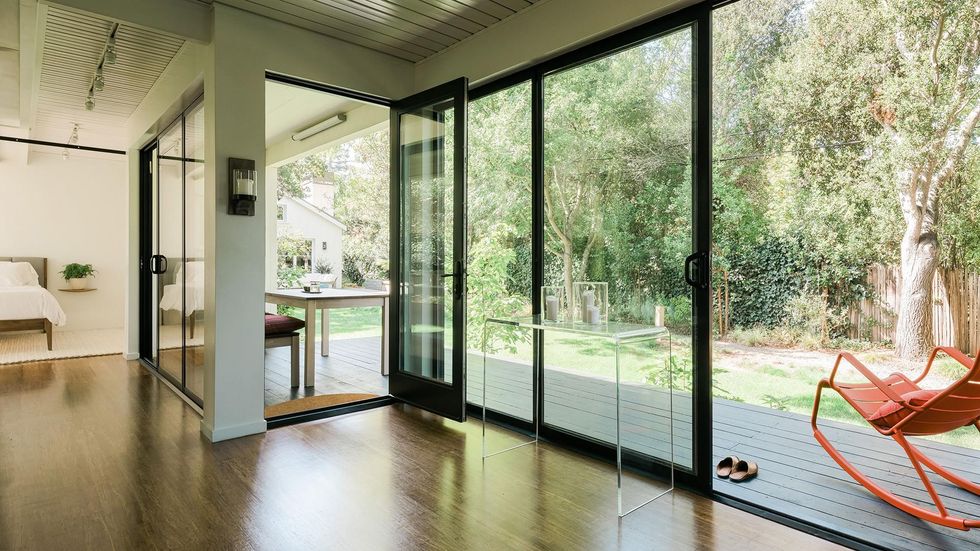
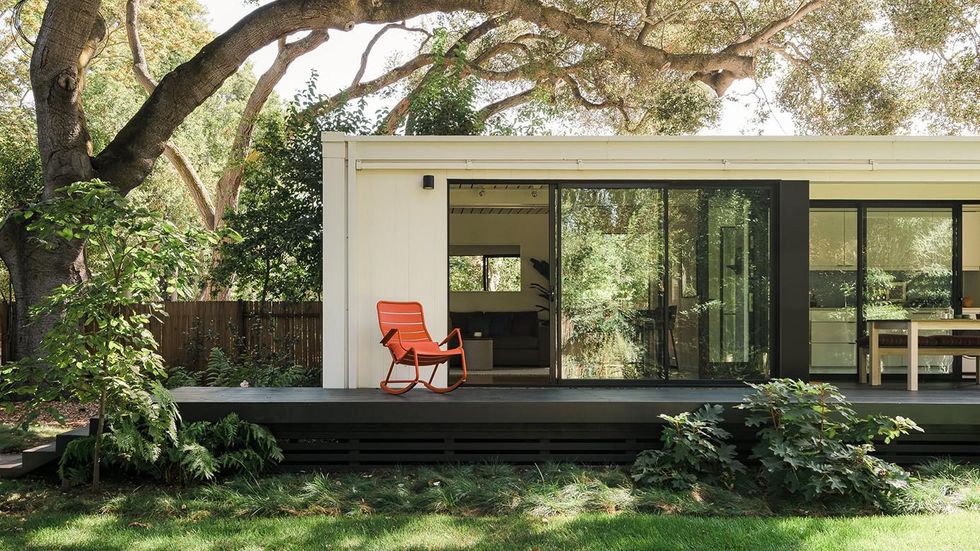
Design, Bitches
The Los Angeles-based architectural firm founded in 2010 describes itself as having a "bold and irreverent vision." Its projects include urban infill ground-up offices to single-family homes, adaptive re-use of derelict commercial buildings and renovations of historic landmarks.
Its pre-approved design, named "Midnight Room," is a guest house/ studio. Its bedroom can be left open for a loft feel or enclosed as a separate room. The design is a one-story, one-bedroom at 454 square feet.
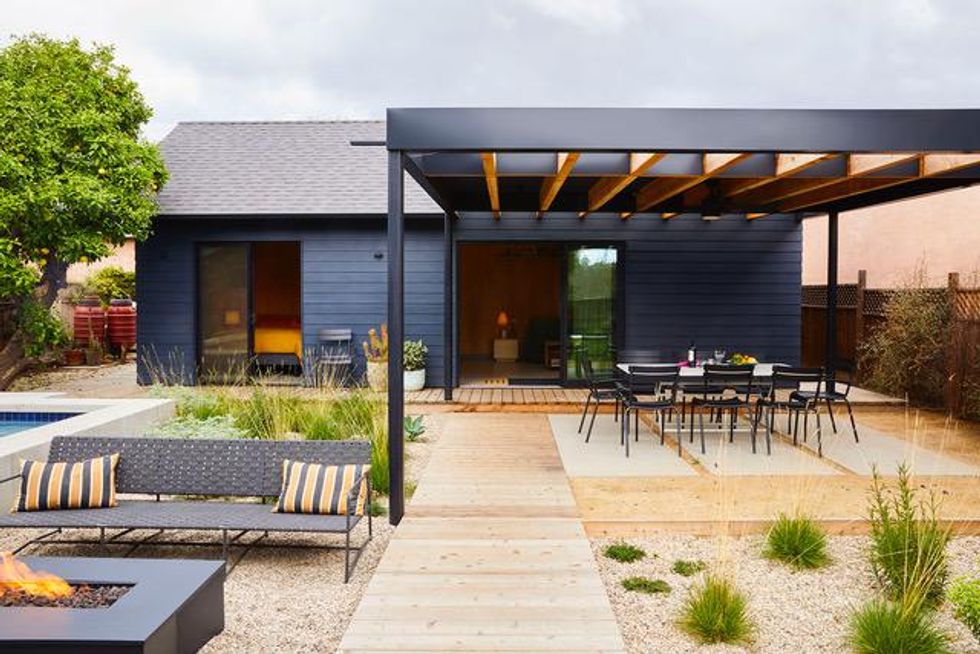
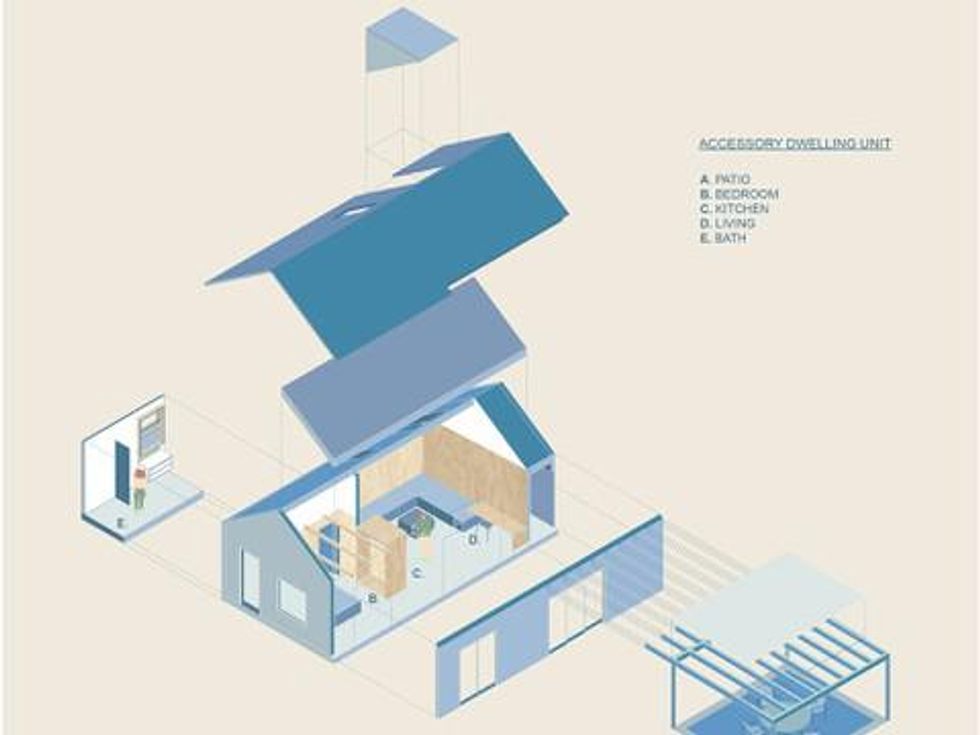
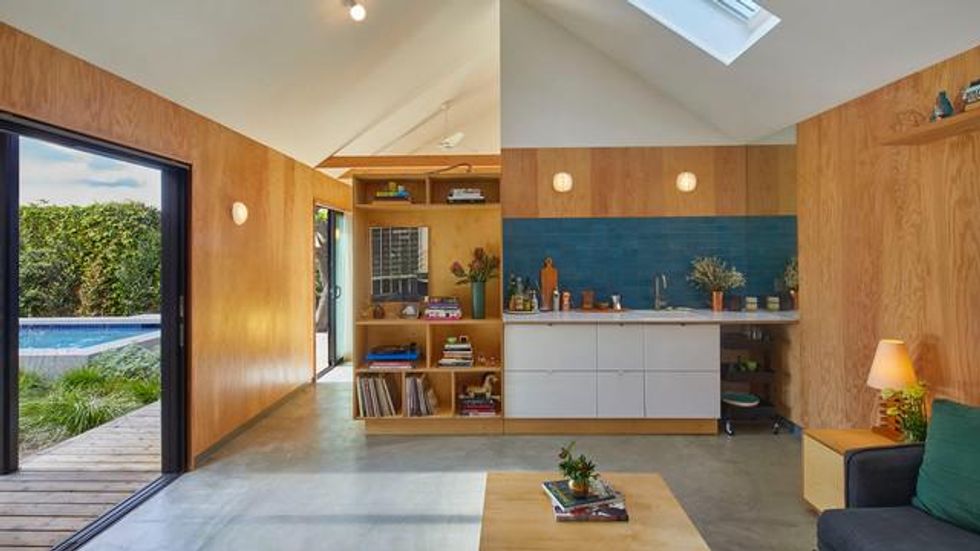
Escher GuneWardena Architecture
Founded in Los Angeles in 1996, Escher GuneWardena Architecture has received international recognition and has collaborated with contemporary artists, worked on historical preservation projects and more.
The company has been approved for two different one-story, one- or two-bedroom units, one at 532 square feet with an estimated cost of $200,000 and another at 784 square feet with an estimated cost of $300,000. The firm noted the costs depend on site conditions and do not include soft costs. Those could add 10% to 12% to the total construction costs.
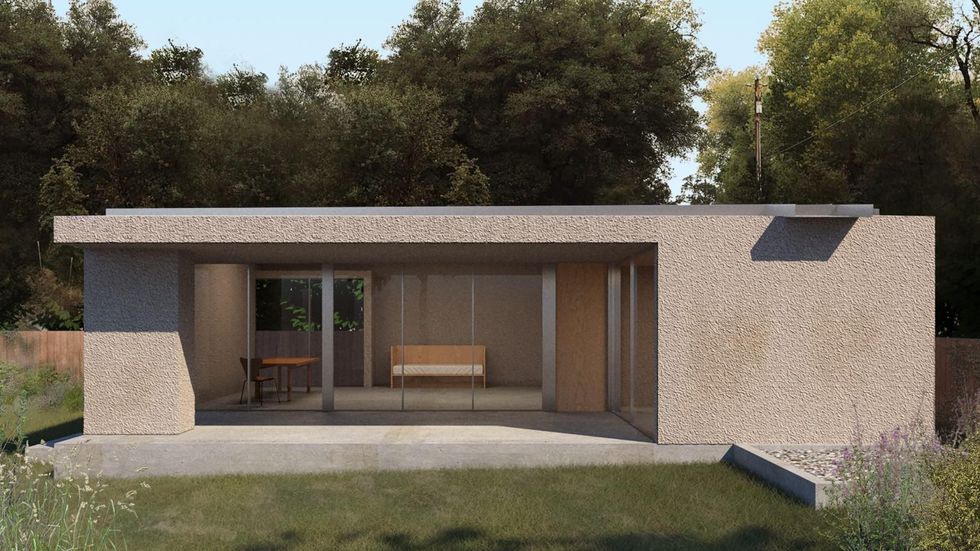
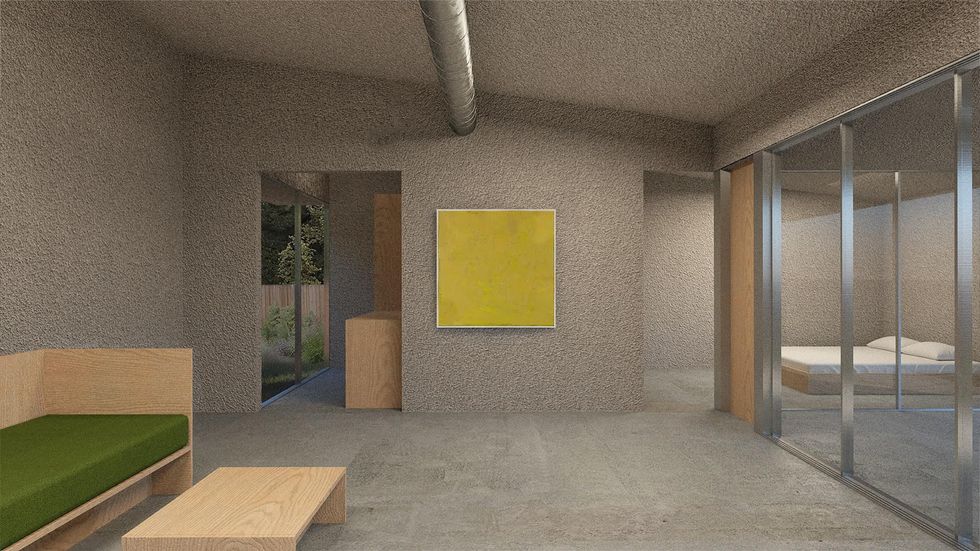

First Office
First Office is an architecture firm based in Downtown Los Angeles. Its approved ADUs will be built using prefabricated structural insulated panels, which allow for expedited construction schedules and high environmental ratings.
The interior finishes include concrete floors, stainless steel counters and an occasional element of conduit.
There are five options:
- A one-story studio, 309 to 589 square feet
- A one-story one-bedroom, 534 to 794 square feet
- And a one-story two-bedroom, 1,200 square feet

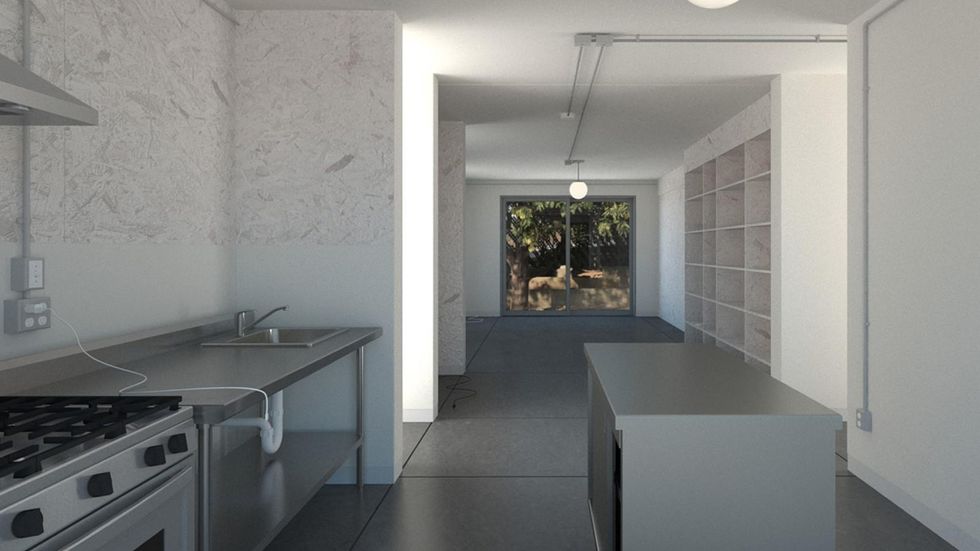
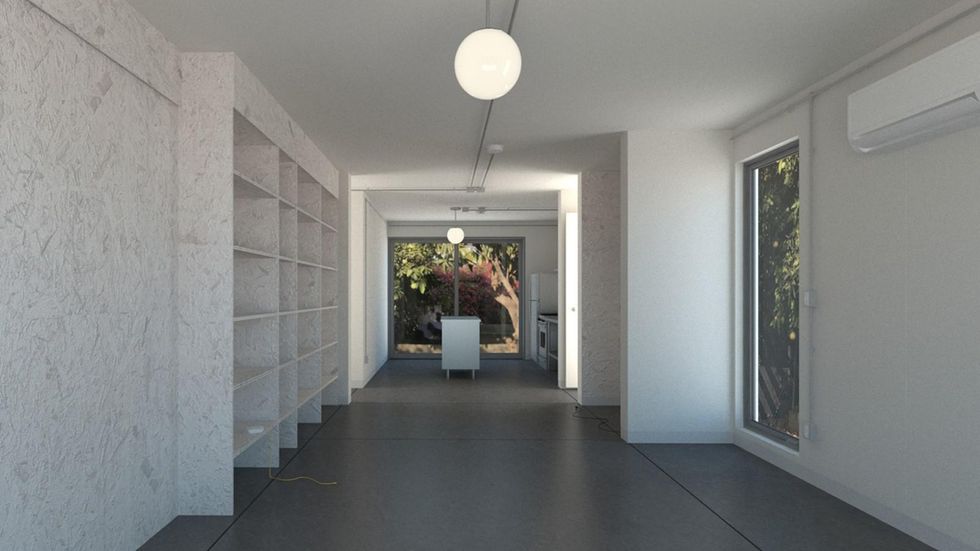
Fung + Blatt Architects

Fung + Blatt Architects is a Los Angeles-based firm founded in 1990.
The city has approved its 795-square-foot, one-story, one-bedroom unit with a roof deck. It estimates the construction cost to be $240,000 to $300,000, excluding landscape, site work and the solar array. Homeowners can also expect other additional costs.
Taalman Architecture/ IT House Inc.
The design team behind "IT House" is Los Angeles-based studio Taalman Architecture. Over the past 15 years, IT House has built more than 20 homes throughout California and the U.S.
The IT House ADU standard plans include the tower, bar, box, cube, pod and court.
The city has approved four options, including:
- A two-story including mechanical room, 660 square feet
- A two-story including mechanical room, 430 square feet
- A one-story studio, 200 square feet
- A one-story including mechanical room, 700 square feet
The firm also has another two projects pending approval: a 360-square-foot one-story studio and a one-story, three-bedroom at 1,149 square feet.

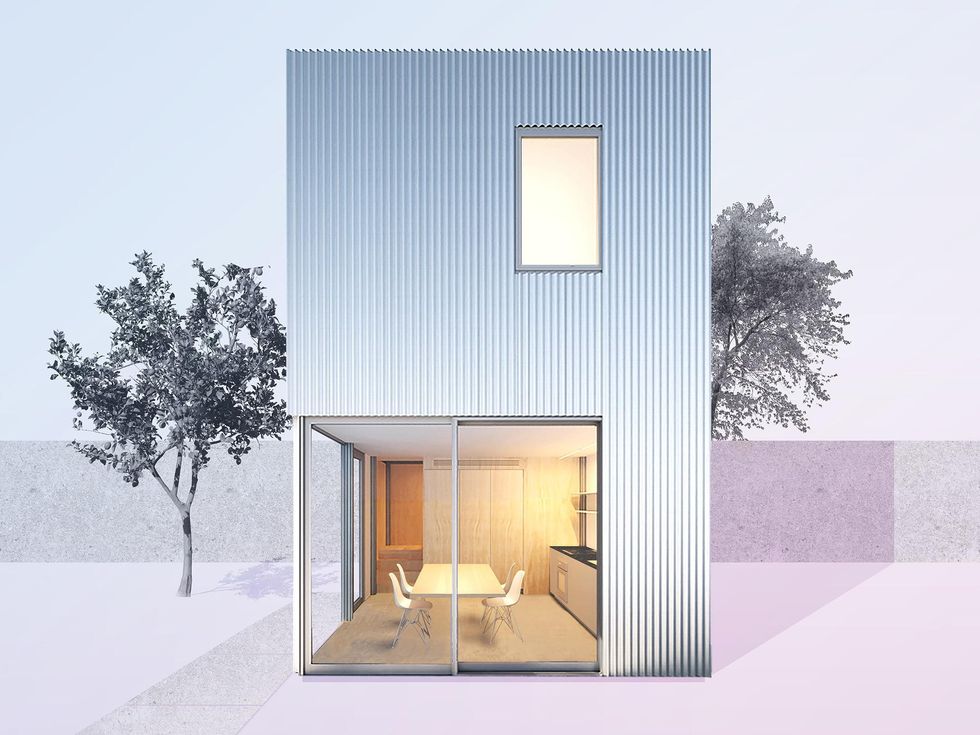
LA Más
LA Más is a nonprofit based in Northeast Los Angeles that designs and builds initiatives promoting neighborhood resilience and elevating the agency of working-class communities of color. Homeowners who are considering their design must commit to renting to Section 8 tenants.
The city has approved two of LA Más' designs: a one-story, one-bedroom, 528 square feet unit and a one-story, two-bedroom, 768 square feet unit. The firm has another design for a one-story studio pending approval. That design would be the first 3D-printed ADU design in the city's program.



Jennifer Bonner/MALL
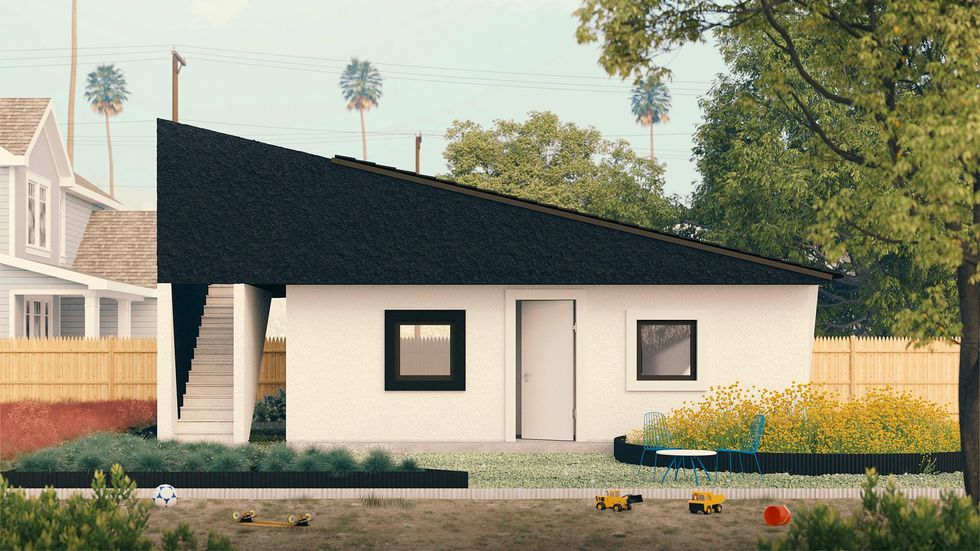
Massachusetts-based Jennifer Bonner/MALL designed a "Lean-to ADU" project, reinterpreting the stucco box and exaggerated false front, both Los Angeles architectural mainstays.
The design has been approved for a 525-square-foot one-story, one-bedroom unit with a 125-square-foot roof deck.
sekou cooke STUDIO
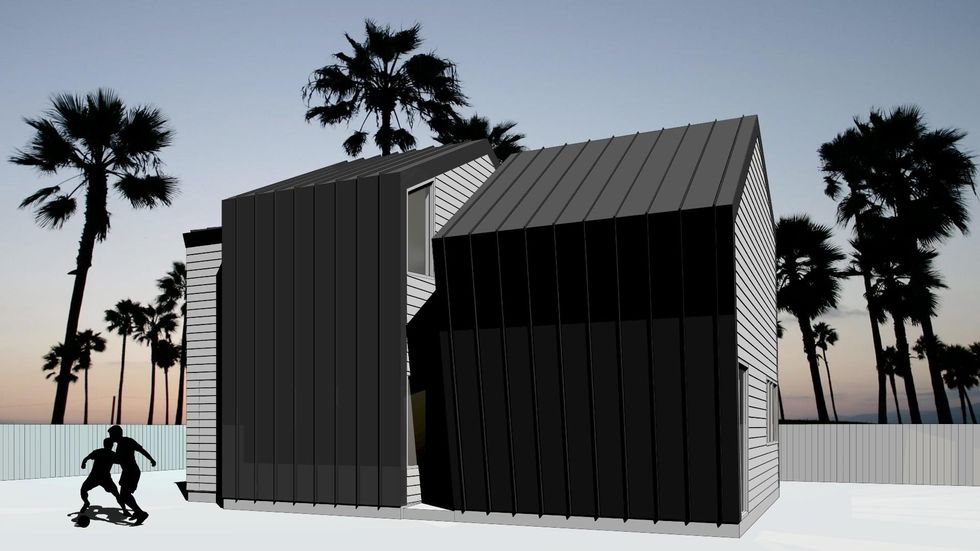
New York-based sekou cooke STUDIO is the sole Black-owned architectural firm on the project.
"The twisted forms of this ADU recalls the spin and scratch of a DJ's records" from the early 90s, the firm said.
Its design, still pending approval, is for a 1,200-square-foot, two bedroom and two bathroom can be adapted to a smaller one-bedroom unit or to include an additional half bath.
SO-IL

New York-based SO-IL was founded in 2008. It has completed projects in Leon, Seoul, Lisbon and Brooklyn.
Its one-story, one-bedroom 693-square-foot unit is pending approval. It is estimated the construction cost will be between $200,000 and $250,000.
WELCOME PROJECTS

Los Angeles-based Welcome Projects has worked on projects ranging from buildings, houses and interiors to handbags, games and toys.
Its ADU is nicknamed The Breadbox "for its curved topped walls and slight resemblance to that vintage counter accessory."
It has been approved for a one-story, one-bedroom 560-square-foot unit.
wHY Architecture
Founded in 2004, wHY is based in Los Angeles and New York City. It has taken on a landmark affordable housing and historic renovation initiative in Watts.
Its one-story, one- or two-bedroom 480 to 800-square-foot unit is pending approval.
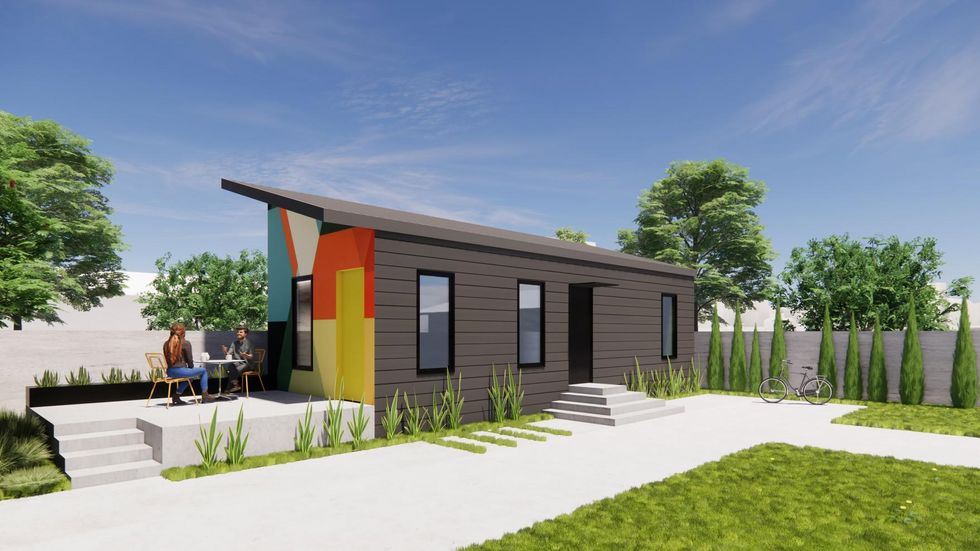

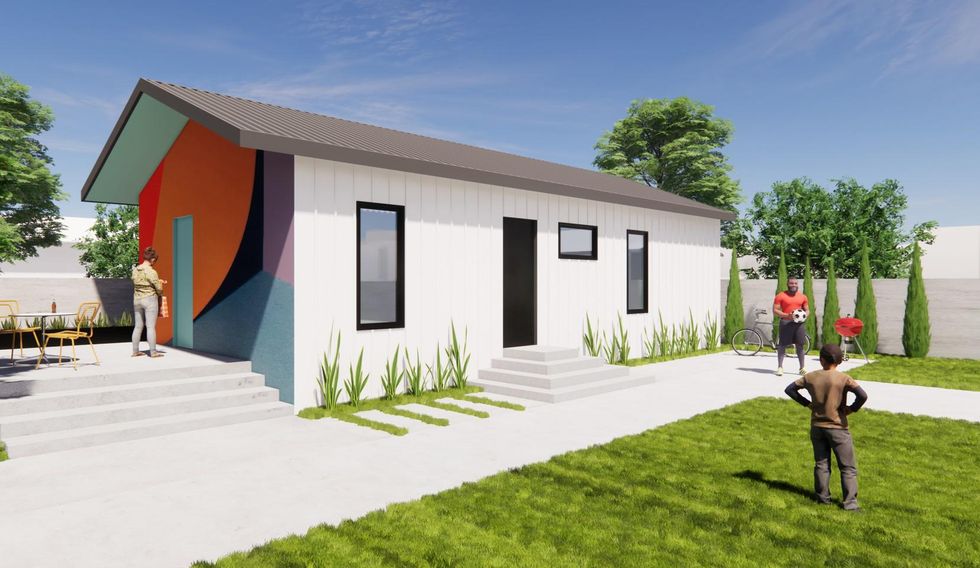
Firms that want to participate in the program can learn more here . Angelenos interested in building a standard ADU plan can learn more the approved projects here.
From Your Site Articles
- United Dwelling Raises $10M to Address the Housing Shortage ... ›
- Plant Prefab Raises An Additional $30 Million - dot.LA ›
- How 3D Printing Could Help Tackle Homelessness in LA - dot.LA ›
- New Bills, New Startups Address Housing in California - dot.LA ›
- LA's ADU Culture Still Faces Financial Barriers - dot.LA ›
- What Will Take To Make Modular Homes Mainstream? - dot.LA ›
Related Articles Around the Web
Sarah Favot
Favot is an award-winning journalist and adjunct instructor at USC's Annenberg School for Communication and Journalism. She previously was an investigative and data reporter at national education news site The 74 and local news site LA School Report. She's also worked at the Los Angeles Daily News. She was a Livingston Award finalist in 2011 and holds a Master's degree in journalism from Boston University and BA from the University of Windsor in Ontario, Canada.
🔦 Spotlight
LA-based Riot Games, celebrated for its popular League of Legends game and the award-winning animated series Arcane, has announced a significant workforce reduction, laying off approximately 11% of its global staff, totaling 530 employees. While CEO Dylan Jadeja described this difficult decision as a necessity, there is a recognition that the broader video game industry has faced challenges with over 10,000 global layoffs since January 2023.
Acknowledging the need for strategic adjustments due to rising costs and limited room for experimentation, Riot Games has decided to shutter its Riot Forge publishing arm, which collaborated with external studios for smaller-scale games. Despite these changes, there is optimism in the commitment to providing affected employees with at least six months of severance pay and eligibility for cash bonuses. Jadeja expressed the company's dedication to its workforce, emphasizing that this decision aims to ensure the long-term sustainability and creativity of Riot Games.
For the broader gaming industry in Los Angeles, this development may indicate a need for companies to adapt to evolving market dynamics. While Riot Games remains an indomitable player with its popular titles like League of Legends, Valorant, the industry as a whole may be reassessing strategies to ensure sustainability and innovation. The workforce reduction may prompt other gaming companies in the region to evaluate their own structures and business models in response to the changing landscape, with a focus on balancing growth, cost management, and creative exploration.
🤝 Venture Deals
Just Announced
- Captura, a startup focused on open-ocean carbon capture, raised $21.5M Series A expansion round led by Future Planet Captial. - learn more
- Acre Venture Partners participated in a $10M Series A for Farm-ng, a startup that has developed a robot that uses AI to help small- and mid-size farms with repetitive tasks like weeding. - learn more
- M13 Ventures participated in a $11.1M Seed Round for Norm Ai, a startup that is using AI to automate some regulatory tasks for chief compliance officers. - learn more
Actively Raising
- ReelCall, Inc., an entertainment technology company focused on powerful apps and platforms that help build and maintain the professional network of connections vital to career growth, is raising a $850K Pre-Seed Round. - learn more
- CZero, a startup building software to decarbonize logistics for logistics businesses and goods business through a vetted marketplace and optimization software. - learn more
- Couri, a technology startup addressing last-mile delivery issues, is raising a $450K Pre-Seed Round at a $2.2M post money valuation. - learn more
- Sweetie, a marketplace to help people plan date nights, is raising a $1.5M Pre Seed Round. - learn more
- StartupStarter, an investment platform that provides real-time data and analytics on startups, is raising an $850K Angel Round. - learn more
If you’re a founder raising money in Los Angeles, give us a shout, and we’d love to include you in the newsletter!
✨ Featured Partner

The WeAreLATech 'Experience' Club is for individuals working in LA tech; you can work at a startup or seasoned tech company.
We're engineers, investors, founders, designers, growth marketers, app developers, product managers and more... who do in person activities together 1-2 times a month. The concept is based on the saying 'More business gets done at the bar than in a boardroom.' That said, there's no panels or mixers. We have enough of those.
WeAreLATech was created by me, Espree Devora, back in 2012. I consider myself to be "an artist of human connection". Each event is my piece of art.
Activities include horseback rides, clay pigeon shooting, hiking, Price is Right gameshow, rooftop cocktails, surfing, escape rooms, food tastings, go karts, luxury beach picnics, drone flying, and the list goes on. We've done 100s of Experiences. Some events are curated by industry and others by role. The goal is to save you time making quality connections. Maintaining a strong culture and keeping the gatherings small, connective and curated is top priority.
Interested in more details about the Club? Check it out here.
And to listen to the WeAreLATech Podcast, click here
📅 LA Tech Calendar
Wednesday, January 31st
- BioSync AI Mixer - Venture into the cutting-edge crossroads of AI and Biotech at the inaugural BioSync AI Mixer in Culver City! This is a brand-new initiative, a collaboration between AI LA, Bioscience LA, BitsinBio, and Nucleate.
- Climate Circuit’s Casual Meetup at Broxton Brewery - Come join Climate Circuit to talk shop on climate tech! All are welcome no matter if you're dipping your toe into this world or have been building in climate tech for a while.
Thursday, February 1st
- Music in the Era of AI- Listen to a conversation between some of the world’s leading artificial intelligence policymakers, scholars, and artists to discuss actions the entertainment industry can take to protect the rights of human creators.
Friday, Feb 2nd
- Pitch and Run LA: Friday Runs - Join Founders and VCs for Pitch and Run Fridays! 7:30am near 17th St & San Vincente for a ~3.5 mile loop at an easy-conversational pace. Pitch and Run is designed to help you connect with others on ideas, passions, and life while enjoying a casual run. They started with a focus on people in tech/startups, but are open to everyone.
📙 What We’re Reading
- Amazon MGM Studios Division Cuts Deal For Esports Content. - learn more
- Will the IPO Market Spring Back in 2024? The First Big Debut Offers Clues. - learn more
- MovieTok Meets Sundance As Creators Hit Park City. - learn more
Read moreShow less
Christian Hetrick
Christian Hetrick is dot.LA's Entertainment Tech Reporter. He was formerly a business reporter for the Philadelphia Inquirer and reported on New Jersey politics for the Observer and the Press of Atlantic City.
K-beauty Entrepreneur Alicia Yoon On Taking the Leap From Corporate Consultant to Starting Her Skincare Brand
05:00 AM | June 07, 2023
Alicia Yoon
On this episode of Behind Her Empire, Peach & Lily founder and CEO Alicia Yoon discusses her journey from being a corporate consultant to establishing her own skincare brand as well as the necessity of having an airtight business model to become successful.
Throughout her life, Yoon suffered from severe eczema and struggled to find effective skincare in the United States that had meaningful results on her sensitive skin. During her high school years in South Korea, she turned to K-beauty brands for help and found the ingredients in those products more suitable to her skin.
In 2012, she founded leading Korean skincare website Peach & Lily as a way to help others take control of their skin problems. Her positive experience with K-beauty formulations inspired her to bring these products to the United States, products with ingredients that were effective but still foreign to Western beauty brands.
Before starting her business, Yoon worked in the corporate sector as a consultant for The Boston Consulting Group and Accenture. Once she realized she wanted to start a business in beauty, she left her role to attend esthetician school in South Korea and study K-beauty alongside trained chemists. She said that passion is absolutely necessary when it comes to starting a business.
“Your head and your heart have to feel 100% passionate and okay with it,” Yoon said. “If you don't love the thing that you're doing, it's really hard to keep waking up and really putting 100% into it and it does take 100% of you.”
Aside from having passion, Yoon believes that entrepreneurs need to take a step back before starting a business and make sure that their business model is completely ironed out so they can achieve long-term success. She said that founders should reevaluate their business models especially “if the cost of goods is just too high to maintain a profitable business.”
She learned the importance of the business model through her first startup, a Korean fashion import firm. Despite winning awards and selling out trunk shows, the business didn’t have much potential for growth, she said.
“There were issues with the business model. It would have been okay as a small cult business,” she said. “While those businesses are great, that's just not what I wanted. I really wanted to go all in with a business where I could really scale it.”
Yoon said that this experience and her time at Harvard Business School gave her the confidence to start Peach & Lily. Being in business school during the financial crisis opened the door to several networking opportunities and allowed her to have open conversations with other founders about their journeys, about what works and what doesn’t, and some of the challenges they had to overcome.
“I think the existential moments lead to more fuel, passion and action,” she said. “It does get hard because there are just going to be moments where you have to wear like 17 different hats.”
Because entrepreneurs play so many different roles in their business, Yoon thinks it can be difficult for them to see the impact that their company can have on its customers. Sometimes, this can make it hard to stay motivated.
Yoon to recharges herself by calling her support group: her friends and family whom she calls her “personal cheerleaders.” When she is having doubts about her work, she says they help remind her of her goals and why she started her business.
Customer reviews also help her stay motivated. Peach & Lily has an email listserv that allows customers to send reviews and comments to the company. Yoon feels the power of her work when she reads reviews that state how her products have changed her customers’ skins or how amazing her customers feel after using Peach & Lily products.
In a little more than ten years, Peach & Lily is on track to become the number five skincare brand at Ulta Beauty.
“I would literally turn on amped up music and I would get so emotional being like, wow, we're actually helping people,” Yoon said. “This is why I'm doing this.”
dot.LA Reporter Decerry Donato contributed to this post.
This podcast is produced by Behind Her Empire. The views and opinions expressed in the show are those of the speakers and do not necessarily reflect those of dot.LA or its newsroom.
Hear more of the Behind Her Empire podcast. Subscribe on Stitcher, Apple Podcasts, Spotify, iHeart Radio or wherever you get your podcasts.
From Your Site Articles
- Behind Her Empire: Salt & Straw Founder Kim Malek On Overcoming The Fear of Starting a Business ›
- Behind Her Empire: ComplYant Founder and CEO Shiloh Johnson on Helping Small Businesses ›
- Behind Her Empire: Anastasia Beverly Hills’ Founder on the Eyebrows That Launched an Empire ›
Related Articles Around the Web
Read moreShow less
Decerry Donato
Decerry Donato is a reporter at dot.LA. Prior to that, she was an editorial fellow at the company. Decerry received her bachelor's degree in literary journalism from the University of California, Irvine. She continues to write stories to inform the community about issues or events that take place in the L.A. area. On the weekends, she can be found hiking in the Angeles National forest or sifting through racks at your local thrift store.
RELATEDTRENDING
LA TECH JOBS


